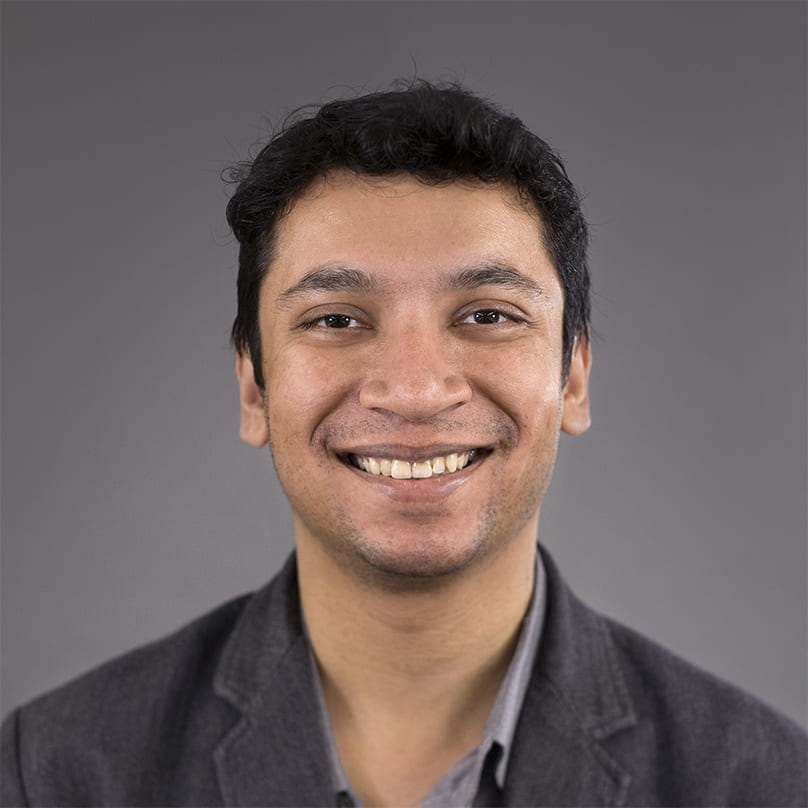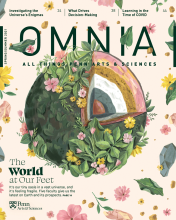Life in the Screen
Rahul Mukherjee, Dick Wolf Associate Professor of Television and New Media Studies, looks at the big picture of our digital life.

In the 1950s, interior decorating magazines talked about the television as just another piece of furniture. Now your television follows you around, along with your phone, your stereo, your bookshelf, your mailbox, and a record of everything you do with them.
Rahul Mukherjee, Dick Wolf Associate Professor of Television and New Media Studies, examines the role of media in debates surrounding technological development, disasters, and dangers, and modernization in a rapidly globalizing world. A central focus of his work is the roles that media, technology, and networks play in the creation of a contested public sphere.
“I move away from just the screen of the smartphone or the television set,” says Mukherjee, who is also an associate professor of English.
His field is vast and ever-changing, including cyber cultures, the internet, social media, misinformation online, the gig economy, global use of mobile phones, and the platforms required. Beyond that, there are the infrastructures needed for cloud computing services, like data centers and optical fiber cables, as well as their environmental footprint. He also studies aspects of distribution and concerns about differential access, issues of race and gender, and the algorithms that curate content.
“My earlier research has been in the area of critical infrastructure studies, and particularly related to national and environmental imaginaries around media infrastructures like cell antennas,” says Mukherjee. “Another focus has been how contemporary platform—streaming video on-demand or SVOD—companies are shaping the distribution of audio-visual content and how that is changing the way scripts are being written and stories being told in television and film industries across the world.”
Just as people are staying at home due to COVID-19 and binging media more than ever, the platform companies have been “creating a new kind of media landscape by labeling everything as content: film, a sound file, a music file, a TV show, a game,” says Mukherjee. “They curate the content for us, and one has to subscribe to them in a certain way, which leads to a particular kind of distribution economy.” With content customized for each user by opaque algorithms that track what we do online, Mukherjee says, there is a tension between having control over what we watch and feeling we’re being led into something.
Our social media presences are another negotiation of privacy. With dating apps or Facebook, we control the content but not necessarily the audience. In his classes, Mukherjee discusses whether selfies on Instagram are superficial, commercial, or self-expression, and the expertise and labor that lie behind a popular image.
“All of us, whether it’s a politician, a corporation, a social movement, or as individuals, we both need and desire a certain amount of privacy and not wanting to be surveilled, but at the same time, also want publicity and attention of people, sometimes not for ourselves, but for issues that we think are important,” says Mukherjee. “So, how does one work out that conundrum on social media?”
Globally, there are now “super apps” that package multiple services, so that WeChat users in China can chat but also hail a ride and order food. Mukherjee notes that mobile phone app companies in China and India have found a way of incorporating an already existing flexible labor force and informal economy into their organization of delivery services, the pros and cons of which need to be carefully studied. And he points out that misinformation (popularized as “fake news”) is not just an American issue, and not limited to just one provider. “In Brazil or India, the platform often associated with misinformation is WhatsApp, and in the U.S. it’s often Facebook,” he says. “But misinformation, for it to circulate, needs to jump across platforms.”
It’s a lot to keep abreast of. “I need to keep changing my readings because my students keep knowing more and using more of these new apps,” says Mukherjee. “I do lose myself sometimes ruminating on the enormity of it all.”




